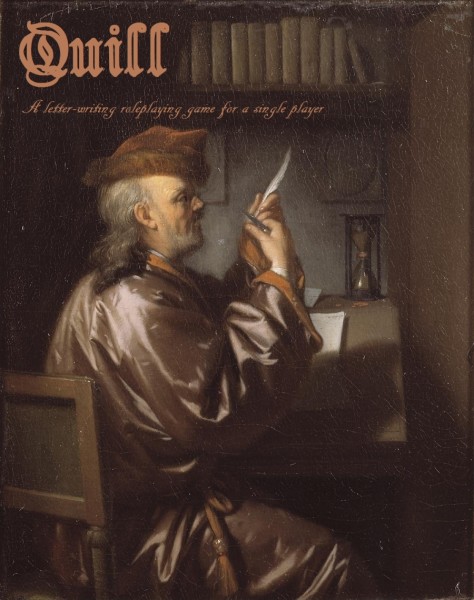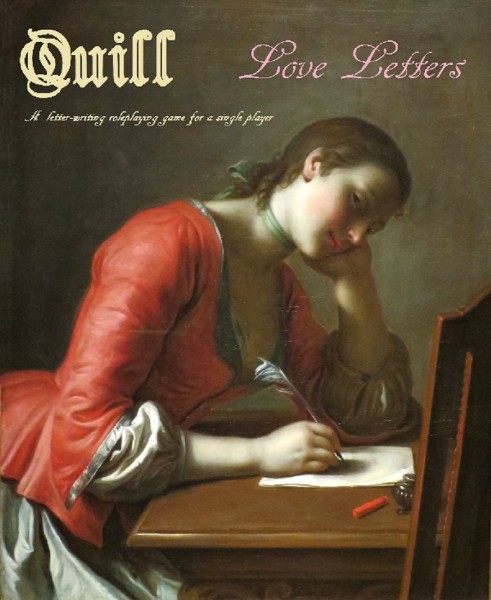Quill: A Letter-Writing Roleplaying Game Review And Interview

We have all heard the saying “The pen is mightier than the sword” Well, now we can put that to the test.
Quill: A Letter-Writing Roleplaying Game is a solo game, where you are tasked with writing a letter. Yes that is correct there is no combat involved, just your letter writing skills.
In Quill, you take on the persona of a letter-writer who is trying to create the best missive to impress the letter’s recipient. Do well, and the letter-reader might be impressed enough to reward you. Perform poorly, and the punishment could be dire. Everything that happens to your character comes down to how well you craft your letter.
This is not your slandered RPG, you have six character classes to choose from that reflect professions with a literate background: Monk, Poet, Aristocrat, Courtier. Knight, and Scholar. Each class has three attributes reflecting their respective competence with the written word: Penmanship (how clean it looks); Heart (how heartfelt it sounds); and Language (how well it reads). Each attribute is rated Poor, Average, and Good, which reflects how many dice you roll when that attribute comes into play (1, 2, or 3 dice, respectively).
Once you’ve determined your class, attributes, and personal skill, it’s time to sit down and write to your letter which will consist of five paragraphs. To do this you grab at least three 6-sided dice and choose one of the four scenarios in the rulebook. Each scenario gives you a profile of the recipient of your letter, and the subject you are writing to them about. Each scenario also gives you the Rules of Correspondence with special circumstances specific to the scenario that will give you a bonus or penalty if applicable. Finally, each scenario has an Ink Pot, a list of words — both Superior and Inferior — that you can use to increase your score. Roll well, and you may use one of the Superior Words in your letter, thus impressing the reader. Roll poorly, and you’re stuck with phrasing that’s a bit more mundane.
All Attributes and Skill checks allow you to roll as many dice as their value allows. If you roll a 5 or 6 on any of the dice, the check is successful. And that’s the basis of the game.
You begin writing your letter keeping in mind the information you’re trying to say with the profile of the eventual reader in mind as well. you’ll want to try to insert one of the Superior Words. When you reach that turn of phrase, you’ll make a Language skill check. Succeed, gain a point and use one of the Superior Words in the Ink Pot. Fail the check, and blunder your way with one of the crummier words. There are further checks anytime you want to try to impress the reader with Flourishes (fancy adjectives/adverbs scattered throughout) or by your Penmanship (make a check at the end of each paragraph to see if you’re able to maintain your legibility). As your letter goes on, you will make checks versus your Heart, Language, and Penmanship scores, gaining points as you hit the high points of your missive, and suffering penalties as you fumble your way through the low points. At the end of the letter, you’ll add up your total score, then refer to the scenario’s “Consequences” section to see how the reader reacted to your letter.
The thing that struck me the most about the game is whether you do well or poorly comes down to a roll of the dice rather than any real ability of the player to write well. Which is not a bad thing at all. I found myself often thinking about my letter I was writing, and wondering if there was a better way to convey what I needed to, or changing up a few things to add some more style to it. Something I will admit I really do in real life.
This is a very different game and that’s a VERY GOOD thing. it’s a “thinking mans” game more then a let’s see how well I can build my character and go dungeon diving and kill as many things. In the end I found myself with the same excitement I often get, as I beat a monster, or get the end of the dungeon, but I was writing a letter to do it!
Quill Love Letters are five all new scenarios that are all based around “love” so it adds a new challenge to the game.
Both Quill: A Letter-Writing Roleplaying Game and the add on Quill: Love Letters are Pay What You Want Via DriveThruRPG.
I had the chance to have a conversation with Scott Malthouse Designer and owner of Trollish Delver Games
Tell us your history with Role Playing games/Dungeons And Dragons
I probably started playing D&D when I was about 13. My friend Steve and I decided to get into 3rd edition and despite there just being two of us playing the rules all kinds of wrong, we had a ton of fun. From there I branched out into Spycraft and Star Wars (the d20 version), although RPGs dropped off my radar during university. Around 2006 I picked up where I left off, went through various group make-ups playing 4e, Call of Cthulhu, Tunnels & Trolls, Shadowrun and now Pathfinder. That’s also when I started blogging about RPGs at Trollish Delver, which was originally a dumping ground for T&T ideas.
Tell us about Quill
Quill is a solo game where the player writes letters in a pseudo-medieval world, with the aim of getting the best response possible. You choose your character, whether that’s a Poet, Monk, Knight or Courtier, all of which have the attributes Penmanship, Language and Heart. The player reads a scenario and uses the ‘ink pot’ – a selection of words and phrases – to scribe a letter. Rolling successfully on your Language allows you to use a superior word from the ink pot, earning you a point, but failure means using an inferior word and scoring no points. Words can be augmented with the use of Heart, essentially injecting more passion into the letter, and you can score points in calligraphy using Penmanship.
While you have the scenario outline and ink pot words as prompts, it’s up to you to get those creative juices flowing and craft an amazing letter. As a bonus, you end up with a lovely roleplaying artifact at the end of the game in the form of this letter.
Is this the first game you have designed
I’ve been designing games for around four or five years now. I started with working on Tunnels & Trolls adventures with the lovely folks at Peryton Publishing. I then decided to take the plunge and design my own game though my own label Trollish Delver Games, which turned out to be Unbelievably Simple Roleplaying (USR), a super rules-lite game that’s now in its second edition. USR turned out to be really popular among gamers who wanted something with a little less crunch and a more flexibility, and since the release I’ve written various expansions like Halberd, Beyond Fear, USR Cyberpunk and Somnium Void. I’ve also created Canary Overdrive, which is a lightweight cyberpunk game that focuses on bad-ass women, and The Village on the Hill, which is a non-violent all-ages storytelling game.
What made you want to design Quill?
I was sitting around thinking about new combat mechanics, of all things. I can’t remember my exact train of thought, but I recall having an idea about using language instead of weapons on a fight, which got to me thinking about letter-writing and eventually Quill was born. I’m a fan of solo games because you can generally play them whenever you like as a nice diversion when you need that RPG fix, and I thought Quill lent itself well to this format. After all, letter-writing is a solitary act, so I thought the mechanics, the fiction and the act of writing the letter all blended together nicely into what you might consider a pseudo-LARP.
I know there is a new expansion out, do you have more planned?
Absolutely. Love Letters came out on Valentine’s Day, which is, as you can imagine, a bunch of scenarios about romance. The next collection is going to be all horror scenarios and I’ll be releasing a full Quill campaign sometime in the next couple of month that’s totally Lovecraft-inspired. This will put the player in the shoes of a 1920s investigator who is writing about their experiences with the Cthulhu mythos, trying their best not to lose their sanity. After that, I plan to release scenario packs on a monthly basis if possible. There will also be some third-party products released, the first of which will be Coal & Parchment by Shoreless Skies, which uses Derek A. Kamal’s dwarvern setting from The DIg.
How has the reaction to Quill been?
Overwhelming, to say the least. I think it’s the curiosity factor, more than anything. People see a game that calls itself ‘a letter-writing roleplaying game for a single-player’ and it piques their interest. But I’ve also been stunned with the positive reviews and all the actual plays that I’ve seen. I’ve had more than one teacher message me to say that they are using Quill in class for various reasons, which is amazing. I’m just very thankful for all the support people have given me – you can pay what you want for the game, but so many people are offering very generous donations. I’m just blown away by it all as a small press publisher, and I’m excited to see what fans make of future supplements.
Discover more from DDO Players
Subscribe to get the latest posts sent to your email.






Leave a Comment